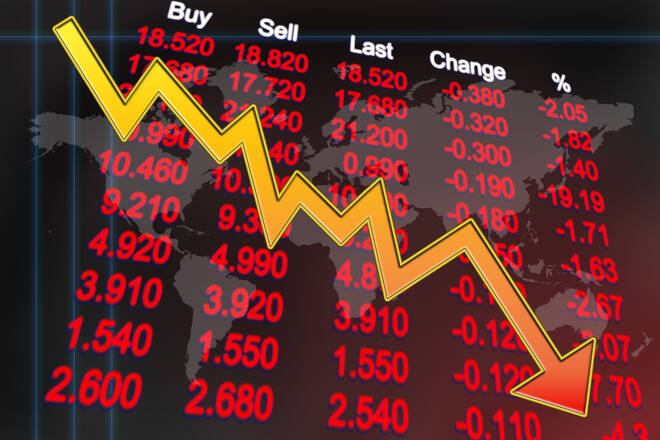Advertisement
Advertisement
Asia-Pacific Markets Rocked by Plunge in Hong Kong Bank Stocks, Rising Global Virus Fears
By:
China stocks ended lower on Monday, dragged by consumer staples and financial stocks after the central bank left its benchmark lending rate unchanged.
The major Asia-Pacific stock indexes were lower on Monday, with Hong Kong’s Hang Seng Index leading losses. Markets in Japan were closed on Monday for a holiday. The catalysts behind the weakness were reports that some Hong Kong banks moved suspicious funds, rising COVID-19 cases and escalating tensions between the United States and China.
In the cash market on Monday, Hong Kong’s Hang Seng Index settled at 23950.69, down 504.72 or -2.06% and South Korea’s KOSPI Index finished at 2389.39, down 23.01 or -0.95%.
In China, the Shanghai Index settled at 3316.94, down 21.15 or -0.63% and Australia’s S&P/ASX 200 Index closed at 5822.60, down 41.90 or -0.71%.
Hong Kong Leads Losses as HSBC and StanChart Shares Tumble after Reports Show They Moved Suspicious Funds
Hong Kong-listed shares of Standard Chartered and HSBC tumbled on Monday following reports that they allegedly moved large sums of suspicious funds.
By Monday afternoon, shares of Standard Chartered tumbled 4.84%. HSBC also plunged 4.52%, trading at lows not seen in more than 25-years, according to FactSet. The moves came after the banks – among several global lenders – were identified in media reports as having allegedly moved suspicious funds over a period of nearly two decades, according to Reuters. The reports cited confidential documents submitted by banks to the U.S. government.
China Shares End Lower as Key Lending Rate Kept Steady for 5th Month
China stocks ended lower on Monday, dragged by consumer staples and financial stocks after the central bank left its benchmark lending rate unchanged, with investors taking profits after expectations of further stimulus lifted shares in the previous session.
China kept its benchmark lending rate for corporate and household loans, the loan prime rate (LPR), steady for a fifth straight month, as expected. The monthly fixing came after the People’s Bank of China kept medium-term borrowing costs unchanged, and after President Xi Jinping said China’s economy remains resilient.
South Korea Stocks Dip as Global Virus Concerns Offset Domestic Export Boost
South Korean shares ended lower on Monday as concerns over surging coronavirus cases in Europe and fading U.S. fiscal stimulus hopes offset optimism around domestic trade and virus situations.
European countries from Denmark to Greece announced new restrictions on Friday to curb surging infections in some of their largest cities, while Britain was reported to be considering a new national lockdown.
In other news, South Korea’s exports for the first 20 days of the month returned to growth for the first time since March, helped by higher microchip and car sales, data showed on Monday.
For a look at all of today’s economic events, check out our economic calendar.
About the Author
James Hyerczykauthor
James Hyerczyk is a U.S. based seasoned technical analyst and educator with over 40 years of experience in market analysis and trading, specializing in chart patterns and price movement. He is the author of two books on technical analysis and has a background in both futures and stock markets.
Advertisement
